|
|
|
Sort Order |
|
|
|
Items / Page
|
|
|
|
|
|
|
| Srl | Item |
| 1 |
ID:
143667
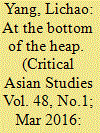

|
|
|
|
|
| Summary/Abstract |
This article explores the health, disease and socioeconomic circumstances of garbage collectors in Guiyang, southwestern China. It aims to contribute to medical anthropology and understandings of Chinese society by examining garbage collectors’ understandings of waste picking, pollution and the health risks and diseases associated with their struggles for survival at the “bottom of the heap” of peri-urban society in contemporary China. Drawing on one month of ethnographic fieldwork, it provides new insights into the oft-neglected subjectivity of individuals struggling for survival at the margins of Chinese society, and how this subjectivity is shaped by their structural position as well as by their own agency in making sense and making the best of their lives.
|
|
|
|
|
|
|
|
|
|
|
|
|
|
|
|
| 2 |
ID:
143664
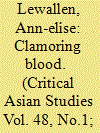

|
|
|
|
|
| Summary/Abstract |
The tension between silence and vocalization, embrace and rejection, of Ainu ancestry has been a key factor in negotiating Ainu subjectivity since Ainu territories were colonized in 1869. As early as 1799, expressions of Ainu ethnicity were alternately cloaked and exaggerated as Japan vacillated between assimilation and segregation policies in eastern Hokkaido Ainu communities. Officially recognized as Japan's indigenous peoples in 2008, Ainu subjectivity has become increasingly politicized as the state and other stakeholders seek to define Ainu ethnicity for future legislation. Today Ainu belonging is frequently gauged by bodily metaphors of a vocalized blood. Cultural sensibility and blood are often conflated in Ainu discourses of identity: Ainu revivalists report that a sensation of “clamoring blood” (J: chi ga sawagu) inspires them to revisit ancestral memories and begin fashioning Ainu identities. Historically, intra-Ainu relations were not bound to blood but instead embodied in material expressions, such as invisible cords for women and crest-like emblems for men, symbols that enabled flexibility where needed. Since the twentieth century, the hyper focus on blood raises the specter of colonially imposed rhetorics of eugenics, assimilation policies, and specifically, the problem of race. Relatedness in the Ainu community is not exclusively defined by “consanguineal relations”; rather, a long history of adopting ethnic Japanese children and non-Ainu into Ainu families renders complex the question of identity. This article assesses how immutable notions of racial difference intersect with self-determination and current articulations of Ainu identity.
|
|
|
|
|
|
|
|
|
|
|
|
|
|
|
|
| 3 |
ID:
143662
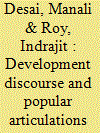

|
|
|
|
|
| Summary/Abstract |
This article discusses how members of marginalized groups in the Indian state of Gujarat make sense of hegemonic discourses about national development in light of their own experiences and material circumstances. For many, the idea of development resonates even when they do not experience material progress in their lives. This partial hegemony of development discourse can be explained by the concept of “political articulation.”. This captures the political process by which parties succeed, at specific historical moments and under certain circumstances, in joining different, even potentially conflictual interests by referring to a common idea and project. The article focuses on Ahmedabad city where the Bharatiya Janata Party (BJP) has created a cross-caste bloc through the trope of development. The BJP has been particularly effective in linking the idea of development to mundane concerns about security, identity and spatial order. However, anxieties about the degradation of labour by increased casualization, informalization, and socio-spatial marginalization have disrupted this common sense linkage and weakened the hegemony of the BJP's model of development.
|
|
|
|
|
|
|
|
|
|
|
|
|
|
|
|
| 4 |
ID:
143663
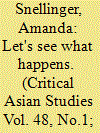

|
|
|
|
|
| Summary/Abstract |
This article analyzes Nepali student activists’ resistance and resilience as strategies that foreground their aspirations within existing political constructs. While they may enter into party politics through student organizations, they downplay their roles as political party foot soldiers. By focusing on their creative strategies and coping mechanisms during the political movement that ousted the monarchy in 2006, I highlight the nature of hope in youth political action through a common phrase they use: “Let's see what happens.” Using the concept of “subjunctive instrumentality” and ethnographic engagement, I analyze students’ internal micro-politics alongside public protests to demonstrate how they interweave the categories of idealism and opportunism, simultaneously inhabiting both in a way that makes politics personal and the personal political. These student activists’ “not-yet” orientation, in which they mobilize political, temporal, and symbolic contingencies, provides alternative templates for the present and visions for the future.
|
|
|
|
|
|
|
|
|
|
|
|
|
|
|
|
| 5 |
ID:
143668
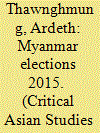

|
|
|
|
|
| Summary/Abstract |
On November 8 the vast majority of Myanmar's citizens participated in what official observers – international and domestic – widely hailed as the most genuinely competitive, free, fair, and orderly parliamentary elections in the nation since 1990. Yet the poll, which resulted in a resounding victory for the National League for Democracy (NLD), surprised many observers, who expected that members of the ruling party, the Union Solidarity and Development Party (USDP), would have done better through widely anticipated vote-rigging and manipulation of the results. Right up to a few days before the vote, observers were concerned about the possibility of a cancellation of the election as a result of politically motivated violence or, in the event they went ahead, administrative chaos resulting from errors in voters’ registration information and large-scale vote-rigging and manipulation by the ruling party. These fears were well-founded given that only 3 weeks prior to the elections, the government's Union Election Commission (UEC) proposed delaying the polls, citing recent floods that had devastated 12 out of Myanmar's 14 states and regions, killing 103 people and displacing 1 million others. This proposal predictably met strong resistance from the NLD and other opposition parties, which expected a strong public support for them in the poll.
|
|
|
|
|
|
|
|
|
|
|
|
|
|
|
|
| 6 |
ID:
143665
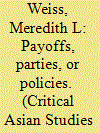

|
|
|
|
|
| Summary/Abstract |
A key part of what sustains electoral authoritarianism over the long term is genuine popular support. Dominant parties, particularly in a developmental context (the primary setting for such regimes), and especially where elections are more than minimally meaningful, curry performance legitimacy and loyalty not just through skewed rules and coercion, but through material incentives: “money politics.” If challengers can find a way to de-emphasize support based on material inducements, they stand a chance of securing gains via elections, rather than relying on economic downturns to shrink patronage coffers. Drawing on extensive original ethnographic and survey data from electoral-authoritarian Malaysia, I explore campaign finance and distributions on both sides in the latest, most regime-threatening general election, which was held on May 5, 2013. Evidence suggests that it was by disentangling clientelist networks from the patronage they so often serve to disseminate, allowing a focus on more programmatic than particularistic appeals, that the opposition Pakatan Rakyat alliance so nearly bested the long-dominant Barisan Nasional regime. Persona – being known and seen among the electorate – still matters as much as before, but relies less consistently than in the past on targeted patronage as a premise for loyalty.
|
|
|
|
|
|
|
|
|
|
|
|
|
|
|
|
| 7 |
ID:
143666
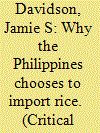

|
|
|
|
|
| Summary/Abstract |
Embedded in the debate in the Philippines over food security and food sovereignty are three conventional reasons why the country is a longstanding rice importer: geography, exploitative international policy pressure predicated on the dictates of neoliberalism, and colonial history. This paper argues that these conventional reasons share two limitations. First, they attribute mono-causal reasons for perennial rice imports, either in the form of geography, exogenous power, or history. While these perspectives are not wrong, each on its own is inadequate. Multiple, contributing factors have and will continue to abound. Second, each of these arguments limits Filipinos' agency. Through a four-part argument, I show how Filipinos have had more say in the reasons for serial rice imports than these conventional accounts allow.
|
|
|
|
|
|
|
|
|
|
|
|
|
|
|
|
|
|
|
|
|